Unaccompanied Children: Something is Not Right In Our Hemisphere
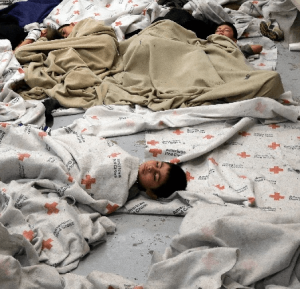
Child detainees sleep in a holding cell at a US Customs and Border Protection processing facility [SOURCE: Reuters/Eric Gay/Pool]
BY CHRIS KERR | July 7, 2014
Over the past month, the media has been filled with theories about why unaccompanied children are streaming across our border from Central America in record numbers. Some have suggested that these children are seeking to reunite with a mother or father who has been residing in the U.S. or that they left home seeking greater economic opportunities. These reasons are certainly playing a role in the decisions that children and families are making, but there is something much more serious — an invasive culture of violence that is plaguing Central America’s Northern Triangle (Honduras, Guatemala, and El Salvador).
A Deadly Reality: Violence in Honduras, Guatemala, and El Salvador
Violence in the “Northern Triangle” has seen a steep increase during the last decade. This region is now one of the most violent in the world according to United Nations Office on Drugs and Crime. The murder rate in Honduras is currently the highest in the world, where murders of women and girls have escalated by 346% and murders of men and boys have increased by 292% since 2005. In El Salvador and Guatemala, murder rates have also steadily grown over the last decade, with the two countries now occupying the 3rd highest homicide rate and 8th highest homicide rate in the world respectively.
According to the National Commissioner on Human Rights (National Ombudsperson) of Honduras, from 2010 to 2013 at least 458 children under 14 years of age died of violent circumstances. According Casa Alianza, a Honduran non-governmental organization that provides victims of sexual exploitation and human trafficking, in the first three months of this year, 271 children and youths under 23 years of age have been assassinated. In 2013, a Honduran woman was killed every 15 hours. Sadly, because of a culture of impunity and a failure to take seriously cases of violence against women and girls, only 2% of these deaths were even investigated by police.
When we consider the endemic culture of violence in El Salvador, Honduras and Guatemala, answering the question of “why” families are risking their lives to seek refuge in the U.S. or sending their children becomes much clearer. Staying in these countries doesn’t just mean being away from family members or living in abject poverty, it can be the difference between being dead and having a chance to live free of the fear of assault and violent death.
In light of the disturbing picture these statistics paint about life in this region, it is imperative that our elected officials enact responsible measures that demonstrate our country’s desire to be an ethical and compassionate leader in the world. The United States has both the moral fortitude and capacity to respond humanely to those seeking refuge from tremendous violence.
Faith-based partners like Jesuit Refugee Service USA and the national advocacy office of the U.S. Jesuit Conference have identified actions the United States can implement in the coming weeks, months, and years, some of which are highlighted below.
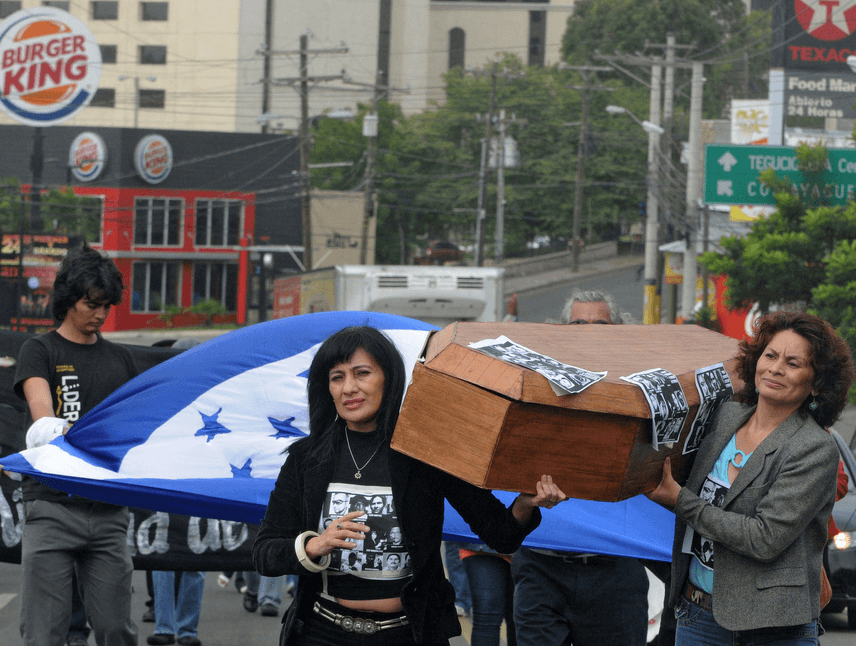
Journalists hold a coffin as they protest against the murder of colleagues, in Tegucigalpa on December 13, 2011. [SOURCE: AFP PHOTO/Orlando SIERRA]
The U.S. should support initiatives in Central America that reduce violence in communities, protect victims of violence, and assist Central American and Mexican police and military on the condition that they comply human rights standards. The U.S. can provide resources and technical assistance for Central American shelters serving girls and women victims of violence in El Salvador, Guatemala, and Honduras where shelters are limited and often under resourced.
Invest in Sustainable Development in Central America
U.S. agencies should support results-oriented initiatives like migrant reintegration programs, job training and job creation programs targeted at urban youth in high violence areas, and substantially invest in small-scale agriculture initiatives that assist rural communities.
Strengthen Regional Protection for Children and Migrants
U.S. officials need to support children protection systems that respond to cases of abuse or violence toward minors in both Central America and Mexico. Secondly, we can do more to support the United Nations High Commissioner for Refugees (UNHCR) so that they can effectively assess current displacement; and establish refugee resettlement processing in Central America and Mexico. Specifically, we could make a major statement by providing significant funding for a robust United Nations High Commissioner for Human Rights presence in Honduras, allowing their government to more effectively decrease corruption, ensure that those who commit violent acts are held accountable and protect the rights of those vulnerable to migration.
Respond to the Humanitarian Situation in the U.S.
The Department of Homeland Security (DHS) needs to enforce humane standards for all short-term Border Patrol facilities and end the inappropriate and unnecessary use of detention of children and families. Government agencies need to work together to improve processes for determining the eligibility of migrants for asylum and humanitarian relief.
We must also respond to the backlog of more than 360,000 pending cases in federal immigration courts, by improving legal process and by increasing funding to the Executive Office of Immigration Review, providing legal representation for all minors and in-person individual adjudications for persons apprehended. Most importantly we must resist measures like those recently proposed by President Obama which would allow for the swift deportation of children (within 15 days) without properly screening these kids to find out if they are refugees, were trafficked, or were victims of abandonment and neglect. Congress authorized these special protections for unaccompanied children in the 2008 update of the Trafficking Victims Protection Act for good reason, to protect the most vulnerable.
Complex Problems Require Comprehensive Solutions
In the midst of a grave humanitarian crisis it would be easy for our country to find the path of least resistance. However complex problems require comprehensive solutions. By coming to our country, 60,000 children and thousands of mothers and fathers have sent a message that something is not right in our hemisphere. As a country, we are capable of responding compassionately and intelligently to the suffering of our neighbors.
ADDITIONAL RESOURCES FROM JRS/USA & U.S. JESUIT CONFERENCE:
Recommendations for U.S. Government Action: Smart responses to increased migration from Central America
Myths and Facts Regarding Rising Numbers of Central American Migrants Arriving in the United States
Chris joined the Ignatian Solidarity Network (ISN) as executive director in 2011. He has over fifteen years of experience in social justice advocacy and leadership in Catholic education and ministry. Prior to ISN he served in multiple roles at John Carroll University, including coordinating international immersion experience and social justice education programming as an inaugural co-director of John Carroll’s Arrupe Scholars Program for Social Action. Prior to his time at John Carroll he served as a teacher and administrator at the elementary and secondary levels in Catholic Diocese of Cleveland. Chris speaks regularly at campuses and parishes about social justice education and advocacy, Jesuit mission, and a broad range of social justice issues. He currently serves on the board of directors for Christians for Peace in El Salvador (CRISPAZ). Chris earned a B.A. and M.A. from John Carroll University in University Heights, Ohio. He and his family reside in Shaker Heights, Ohio.

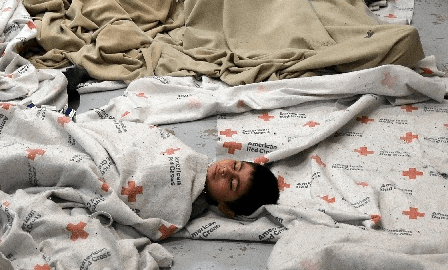
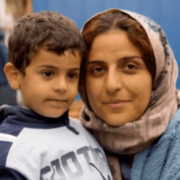
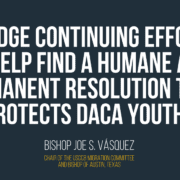

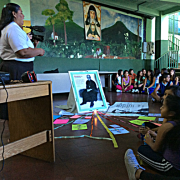
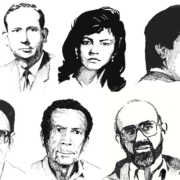
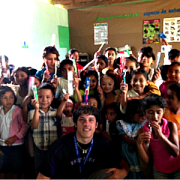



Leave a Reply
Want to join the discussion?Feel free to contribute!